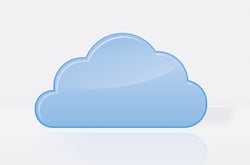 When you use DocuWare as a Hybrid Cloud system, you get the benefits of two systems. The local network is extra protected from external access and provides no entry point for intruders. At the same time, your customers profit from the 24/7 availability and performance of a true public cloud system and your company never has to invest in the IT infrastructure of a cloud. But what do they mean exactly by “Hybrid” and isn’t a cloud always “public“?
When you use DocuWare as a Hybrid Cloud system, you get the benefits of two systems. The local network is extra protected from external access and provides no entry point for intruders. At the same time, your customers profit from the 24/7 availability and performance of a true public cloud system and your company never has to invest in the IT infrastructure of a cloud. But what do they mean exactly by “Hybrid” and isn’t a cloud always “public“?
Software as a cloud service is all the rage. But the terms you often hear in this context – like hybrid, public or private – aren’t always used consistently. To help with this, here’s an overview of the most important concepts:
- Cloud: A cloud service is one where the IT infrastructure such as computing capacity, storage, bandwidth or software services are provided via the Internet. A main characteristic for a cloud service is that resources can be added or eliminated based on demand.
- Public Cloud: The available infrastructure and services are publicly available. This is only possible through extensive IT effort. DocuWareCloud is therefore a “true” cloud service. Anyone with Internet access can take part in the DocuWare Cloud.
- Private Cloud: this only provides access to a company‘s employees. The IT is part of an on-premisesystem that is usually locally installed within your own company. All services are accessible via the internal company network. It is also possible to host a Private Cloud externally with a Managed Service Provider and create safe access via VPN, as an example.
- Hybrid Cloud: In a Hybrid Cloud, components of both a locally installed and cloud system are used. As an example, you might use a locally installed version of DocuWarein general but outsource some file cabinets into the cloud to serve certain purposes.
More on how DocuWare Cloud and a local DocuWare system work effectively as a Hybrid Cloud coming soon to this blog.
For more information on DocuWare Cloud

